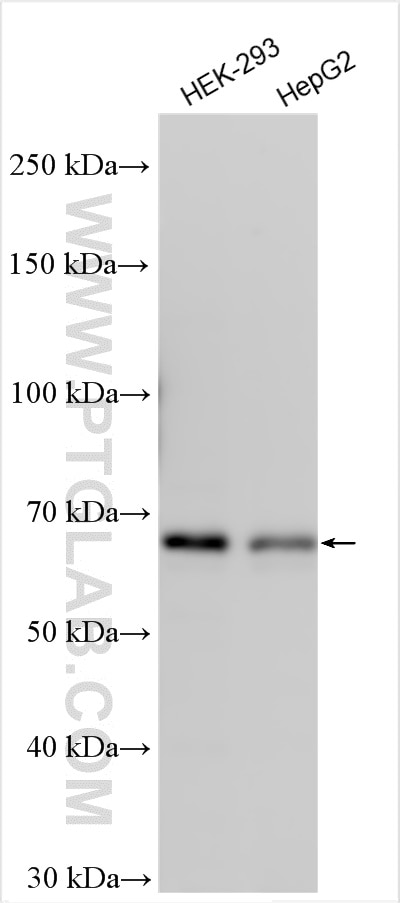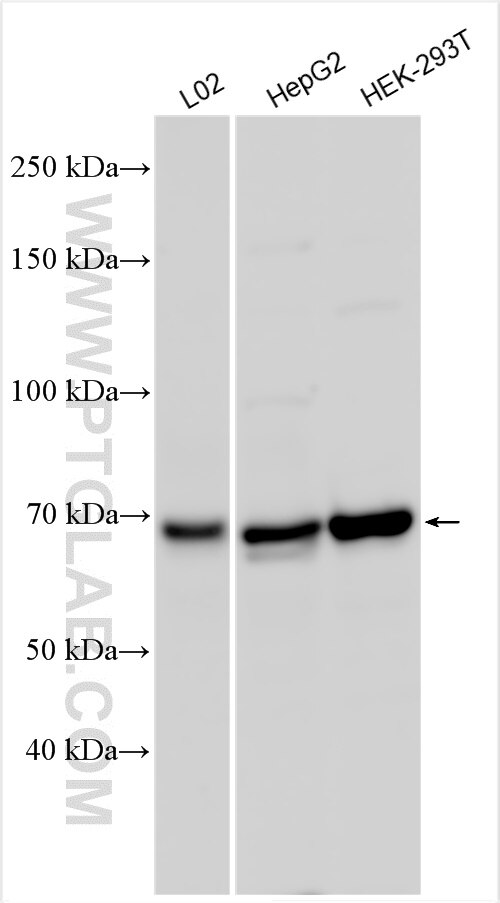POLL Polyklonaler Antikörper
POLL Polyklonal Antikörper für WB, ELISA
Wirt / Isotyp
Kaninchen / IgG
Getestete Reaktivität
human
Anwendung
WB, ELISA
Konjugation
Unkonjugiert
Kat-Nr. : 29920-1-AP
Synonyme
Geprüfte Anwendungen
| Erfolgreiche Detektion in WB | L02-Zellen, HEK-293-Zellen, HEK-293T-Zellen, HepG2-Zellen |
Empfohlene Verdünnung
| Anwendung | Verdünnung |
|---|---|
| Western Blot (WB) | WB : 1:1000-1:5000 |
| It is recommended that this reagent should be titrated in each testing system to obtain optimal results. | |
| Sample-dependent, check data in validation data gallery | |
Produktinformation
29920-1-AP bindet in WB, ELISA POLL und zeigt Reaktivität mit human
| Getestete Reaktivität | human |
| Wirt / Isotyp | Kaninchen / IgG |
| Klonalität | Polyklonal |
| Typ | Antikörper |
| Immunogen | POLL fusion protein Ag31995 |
| Vollständiger Name | polymerase (DNA directed), lambda |
| Berechnetes Molekulargewicht | 63 kDa |
| Beobachtetes Molekulargewicht | 63-70 kDa |
| GenBank-Zugangsnummer | BC068529 |
| Gene symbol | POLL |
| Gene ID (NCBI) | 27343 |
| Konjugation | Unkonjugiert |
| Form | Liquid |
| Reinigungsmethode | Antigen-Affinitätsreinigung |
| Lagerungspuffer | PBS with 0.02% sodium azide and 50% glycerol |
| Lagerungsbedingungen | Bei -20°C lagern. Nach dem Versand ein Jahr lang stabil Aliquotieren ist bei -20oC Lagerung nicht notwendig. 20ul Größen enthalten 0,1% BSA. |
Hintergrundinformationen
POLL (DNA polymerase lambda) functions in DNA repair (PMID: 11457865, PMID: 19806195, PMID: 20693240, PMID: 30250067). POLL has 5-prime-deoxyribose-5-phosphate lyase activity and strand-displacement synthesis activity on gapped DNA substrates, indicating that POLL participates in short- and long-patch base excision repair. POLL is involved in base excision repair (BER) responsible for repair of lesions that give rise to abasic (AP) sites in DNA (PMID: 11457865, PMID: 19806195).
Protokolle
| PRODUKTSPEZIFISCHE PROTOKOLLE | |
|---|---|
| WB protocol for POLL antibody 29920-1-AP | Protokoll herunterladen |
| STANDARD-PROTOKOLLE | |
|---|---|
| Klicken Sie hier, um unsere Standardprotokolle anzuzeigen |



